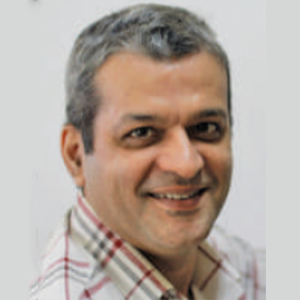
Prof. Amol Dighe is currently a Professor and Dean of Graduate Studies at the Tata Institute of Fundamental Research (TIFR) in Mumbai. He obtained his B.Tech. degree in Engineering Physics from IIT Bombay in 1992, and M.S. and Ph.D. degree in Physics from the University of Chicago in 1994 and 1997, respectively.
After completing his Ph.D. from University of Chicago, Prof. Dighe did his post-doctoral research at the International Centre for Theoretical Physics (ICTP), Trieste, Italy (1997-99); European Centre for Particle Physics (CERN), Geneva, Switzerland (1999-2001); and Max Planck Institute for Physics (MPI), Munich, Germany (2001-03). He has been working in TIFR for the last 15 years.
Prof. Dighe’s area of research include particle physics and astrophysics. He has proposed and analyzed experiments at particle accelerators to understand fundamental interactions of elementary particles. His research is focused on signals of new phenomena beyond the Standard Model of particle physics. His work speaks about how one can understand how the Sun shines, and the happenings inside the stars, by observing particles called neutrinos that come from them. He has explained ways of understanding how supernovae explode through his research.
Prof. Dighe is also involved in the building of the India-based Neutrino Observatory (INO), one of the largest basic science experiments to take place in India. He and his team is building the world’s largest electromagnet in India and go underground with it to look at the sky.
Prof. Dighe is interested in higher education in India, and has helped educational institutions in designing curricula. He is also involved in popularization of science by giving public lectures and writing articles in newspapers and magazines, in Marathi and English.
Prof. Dighe has won a bronze medal in International Maths Olympiad in 1989, Institute Silver Medal from IIT Bombay in 1992, Max Planck-India Partner group leader award (2005-2010), Swarna Jayanti Fellowship by the Department of Science and Technology, Government of India in 2009, and Shanti Swarup Bhatnagar Award by CSIR, Government of India in 2013. He is Fellow of the Indian Academy of Sciences (IASc) and Indian National Science Academy (INSA).
